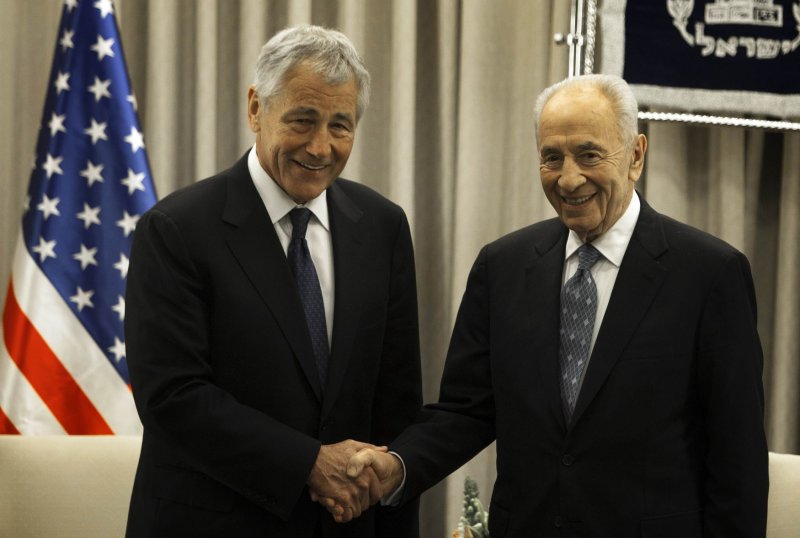U.S. Secretary of Defense Chuck Hagel (L) shakes hands with Israeli President Shimon Peres at the President's office in Jerusalem on April 22, 2013. Hagel arrived in Israel at the start of a six-day regional tour, his first since taking over as Pentagon chief two months ago. UPI/Menahem Kahana/Pool |
License Photo
TEL AVIV, Israel, April 22 (UPI) -- A new flurry of threats by Israeli leaders to strike Iran on their own has coincided with a visit by U.S. Defense Secretary Chuck Hagel to finalize an arms deal that will guarantee Israel's regional military supremacy for a decade or two.
But there is a critical gap between Israel's current military capabilities regarding an attack on Iran, with Tehran's key nuclear facilities the primary target, and the weapons and radar systems the Americans will supply under the new arms package.
Israeli commanders like Chief of Staff Lt. Gen. Benny Gantz boast that Israel can act alone if need be and that's true. But Israel's current military capabilities aren't enough to deliver a knockout blow against Iran's nuclear infrastructure.
The Iranians have duplicated some of their nuclear installations and others are buried deep underground with heavy air defenses.
The Israelis have 100 advanced F-16I and 25 F-16I to carry out attacks and seven known aerial tankers. The limitation on in-flight refueling, the key factor in such a long-range operation, some 2,000 miles there and back, curtails the number of strike aircraft that can be deployed and thus the damage they can inflict.
Israel, unlike the United States, doesn't have the numbers for a sustained offensive, possibly extending over weeks, which would be required to cripple the Iranian nuclear network.
The systems the Americans are promising -- an unknown number of KC-135 tankers; anti-radiation missiles that knock out air-defense radars that control the surface-to-air missiles, and new airborne radars far in advance of what the Israelis have -- are all vital elements for a larger, more effective Israeli assault.
Indeed, providing the KC-135s reverses a long-standing U.S. refusal.
Are the Americans backing off?
The crucial factor in all this, and what isn't known, is when the systems will be provided -- particularly the KC-135s, which mean Israel could greatly increase its airstrike strength and mount operations over several days.
The purpose of this U.S. largesse, apart from being an expression of U.S. support for Israel, isn't known either.
Why press Israel not to attack Iran, for fear of igniting a region-wide conflagration, and then provide it with the very systems that would greatly enhance the destructive effects of its airstrikes and possibly Jericho-2 ballistic missile strikes as well?
So, is something in the wind here? What's the quid pro quo?
Part of the answer could lie in an element that was present when the concept of pre-emptive airstrikes was first mooted several years ago -- Turkey.
Until May 2010, Turkey was Israel's strategic military ally in the eastern Mediterranean. Turkey borders Iran, thus theoretically providing a secure route for Israeli bombers.
Turkey and Israel split after the Israeli navy killed nine Turks on a Turkish organized flotilla taking humanitarian aid to the Israeli-blocked, Hamas-ruled Gaza Strip but in March, U.S. President Barack Obama brokered a rapprochement.
That suited U.S. regional policy, but it also suited the Turks, who have found themselves increasingly at odds with Iran in the regional power stakes.
The Israelis are buying the new U.S. F-35 stealth fighter, which they see as the best option for the kind of airstrike they have in mind.
Unfortunately, the first 20 won't start arriving until 2015, with another 55 following over 2-3 years after that.
But Iran may have nuclear weapons by then, as well as a couple of hundred more ballistic missiles to carry them.
The Israelis have long threatened to unleash unilateral airstrikes on Iran, despite U.S. pressures not to and despite their own limitations. They've been pretty quiet in recent months. The feeling was they'd bowed to U.S. pressure and smoothed out strains with Obama's administration.
But in the last few days, Israeli leaders like Gantz, the new defense minister, Moshe Yaalon, and Strategic Affairs Minister Yuval Steinitz, have all spoken forcefully on Israel standing alone and doing what it must do to survive.
Then last week, the Pentagon announced the Israeli government is seeking to buy 86.4 million gallons of petroleum products, mostly fuel used by Israeli air force jets, for $2.67 billion.





